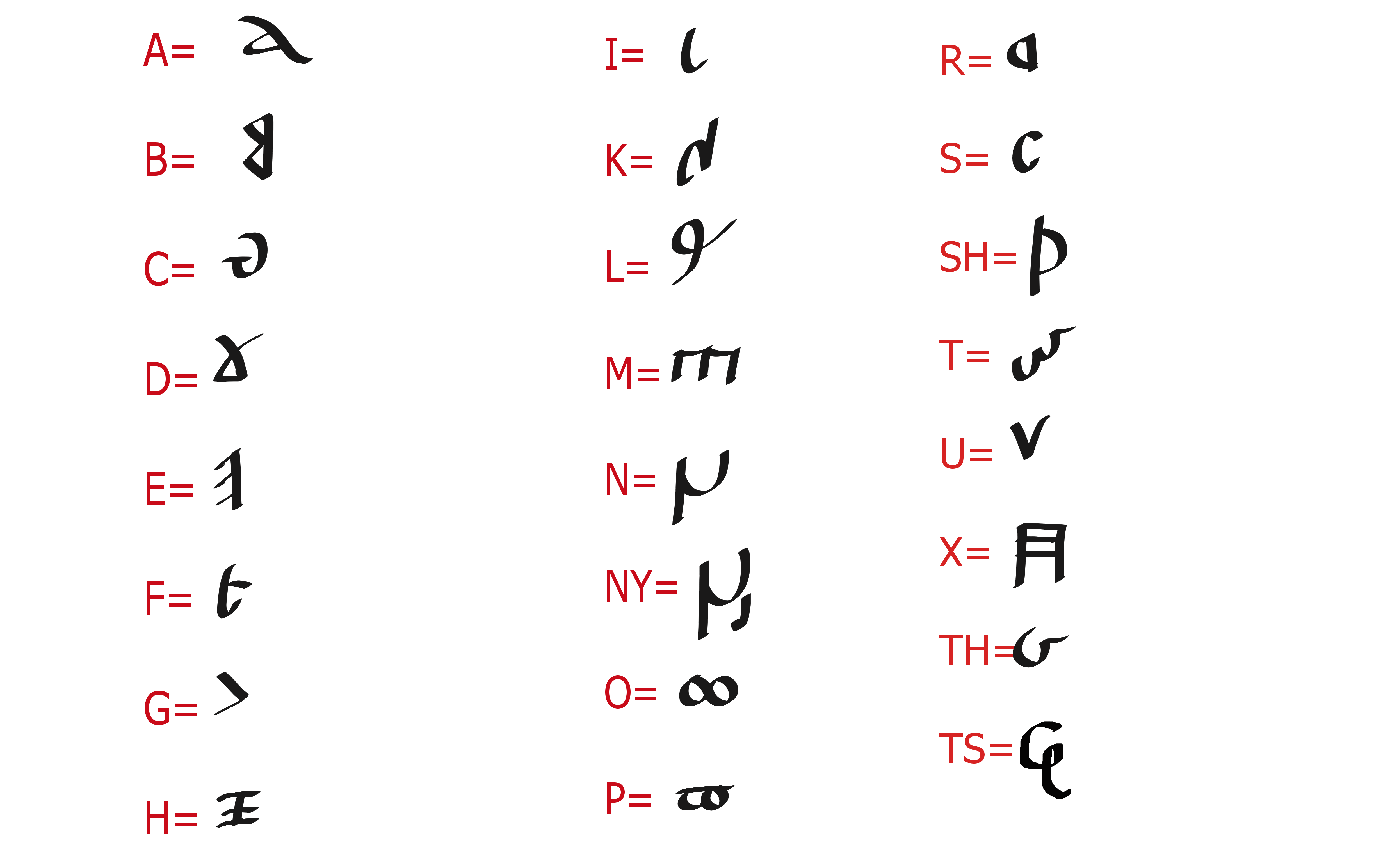Ikarian language
Natively known as: ikarianon /ˈikaˌrianon/
...and he stood holding his hat and turned his wet face to the wind...nit rawd ginyare mong inshit nasharare nit mong pobdati tum shakare eg pe
Pronunciation: /nit rɔd ˈgiɲare moŋ ˈinʃit ˈnaʃaˌrare nit moŋ ˈpobdati tum ˈʃakare eg pe/
Ikarian word order: and he stood his hat holding and his wet face turned the wind to
Spelling & Phonology
Consonant inventory: b d f g k l m n p r s t ŋ ɲ ʃ ʎ ʦ θ| ↓Manner/Place→ | Bilabial | Labiodental | Dental | Alveolar | Palato-alveolar | Palatal | Velar |
|---|---|---|---|---|---|---|---|
| Nasal | m | n | ɲ | ŋ | |||
| Stop | p b | t d | k g | ||||
| Affricate | ʦ | ||||||
| Fricative | f | θ | s | ʃ | |||
| Trill | r | ||||||
| Lateral approximant | l | ʎ |
| Front | Back | |
|---|---|---|
| High | i | u |
| High-mid | e | o |
| Low-mid | ɛ | ɔ |
| Low | a |
Stress pattern: Initial — stress is on the first syllable Spelling rules:
| Pronunciation | Spelling |
|---|---|
| ɔ | aw |
| ɛ | è |
| ŋ | ng |
| ɲ | ny |
| ʃ | sh |
| ʎ | y |
| ʦ | ts |
| θ | th |
Grammar
Main word order: Subject Object Verb (Prepositional phrase). “Mary opened the door with a key” turns into Mary the door opened with a key.Adjective order: Adjectives are positioned before the noun.
Adposition: postpositions
Nouns
Nouns have six cases:- Nominative is the doer of a verb: dog bites man.
- Accusative is the done-to of a verb: man bites dog.
- Genitive is the possessor of something: dog’s tail hits man.
- Dative is the recipient of something: man gives ball to dog.
- Locative is the location of something: man goes to town.
- Ablative is movement away from something: man walks from town.
| Plural | Particle before the noun: ɔ -
aw gal /ɔ gal/ dogs |
| Nominative | No affix
gal /gal/ dog (doing the verb) |
| Accusative | If ends with vowel: Suffix -k
Else: Suffix -ok galok /ˈgalok/ (verb done to) dog |
| Genitive | If ends with vowel: Suffix -n
Else: Suffix -an galan /ˈgalan/ dogʼs |
| Dative | If ends with vowel: Suffix -p
Else: Suffix -ip galip /ˈgalip/ to (the/a) dog |
| Locative | Suffix -e
gale /ˈgale/ near/at/by (the/a) dog |
| Ablative | If ends with vowel: Suffix -t
Else: Suffix -at galat /ˈgalat/ from (the/a) dog |
| Definite | No affix
gal /gal/ the dog |
| Indefinite | Suffix -ɛ
galè /ˈgalɛ/ a dog |
Articles
Ikarian encodes definite article ‘the’, and indefinite article ‘a’ in noun affixes. See Noun section.Pronouns
| Nominative | Accusative | Genitive | Dative | Locative | Ablative | |
|---|---|---|---|---|---|---|
| 1st singular | pawp /pɔp/ I | tep /tep/ me | paw /pɔ/ mine | rem /rem/ to me | nyè /ɲɛ/ at me | dèr /dɛr/ from me |
| 2nd singular | pa /pa/ you | ten /ten/ you | yu /ʎu/ yours | a /a/ to you | rè /rɛ/ at you | ra /ra/ from you |
| 3rd singular masc | rawd /rɔd/ he, it | nad /nad/ him, it | mong /moŋ/ his, its | bor /bor/ to him, at it | mè /mɛ/ at him, at it | to /to/ from him, from it |
| 3rd singular fem | pel /pel/ she, it | the /θe/ her, it | shè /ʃɛ/ hers, its | pawb /pɔb/ to her, at it | gèy /gɛʎ/ at her, at it | do /do/ from her, from it |
| 1st plural | maw /mɔ/ we | i /i/ us | shaw /ʃɔ/ ours | ga /ga/ to us | nyawr /ɲɔr/ at us | yo /ʎo/ from us |
| 2nd plural | yè /ʎɛ/ you all | ya /ʎa/ you all | tawny /tɔɲ/ yours (pl) | nod /nod/ to you all | oy /oʎ/ at you all | nyer /ɲer/ from you all |
| 3rd plural | awk /ɔk/ they | gè /gɛ/ them | nyi /ɲi/ theirs | be /be/ to them | nik /nik/ at them | pawny /pɔɲ/ from them |
Possessive determiners
| 1st singular | paw /pɔ/ my |
| 2nd singular | yu /ʎu/ your |
| 3rd singular masc | mong /moŋ/ his |
| 3rd singular fem | shè /ʃɛ/ her |
| 1st plural | shaw /ʃɔ/ our |
| 2nd plural | tawny /tɔɲ/ your (pl) |
| 3rd plural | nyi /ɲi/ their |
Verbs
Ikarian uses a standalone particle word for past tense:| Past | Particle before the verb: me -
me thèyare /me ˈθɛʎare/ learned |
| Future | Particle before the verb: mɔ -
maw thèyare /mɔ ˈθɛʎare/ will learn |
Progressive aspect
The ‘progressive’ aspect refers to actions that are happening at the time of speaking, such as I am learning.Ikarian uses a standalone particle word for progressive:
| Progressive | Particle before the verb: ti -
ti thèyare /ti ˈθɛʎare/ is learning |
Habitual aspect
The ‘habitual’ aspect refers to actions that happen habitually, such as I learn (something new every day), as opposed to actions that happen once (I learned something).Ikarian uses a standalone particle word for habitual:
| Habitual | Particle before the verb: bab -
bab thèyare /bab ˈθɛʎare/ learns |
Perfect aspect
The perfect aspect in English is exemplified in ‘I have read this book’, which expresses an event that took place before the time spoken but which has an effect on or is in some way still relevant to the present.Ikarian uses an affix for the perfect aspect:
| Perfect | Reduplicate first part of first syllable
thèthèyare /ˈθɛθɛˌʎare/ have learned |
Numbers
Ikarian has a base-10 number system: 1 - uinon2 - yud
3 - peny
4 - petor
5 - pompe
6 - tha
7 - seften
8 - uhto
9 - dab
10 - deken
Hundred - mu
Thousand - nuthmu
Derivational morphology
Adjective → adverb = Suffix -uAdjective → noun (the quality of being [adj]) = If ends with vowel: Suffix -ʎ
Else: Suffix -ɛʎ
Adjective → verb (to make something [adj]) = Suffix -ɛ
Noun → adjective (having the quality of [noun]) = If ends with vowel: Suffix -k
Else: Suffix -ik
Noun → adjective relating to noun (e.g. economy → economic) = Suffix -e
Noun to verb = Suffix -a
Verb → adjective (result of doing [verb]) = Suffix -ɛ
Tending to = Suffix -aʎ
Verb → noun (the act of [verb]) = If ends with vowel: Suffix -ŋ
Else: Suffix -uŋ
Verb → noun that verb produces (e.g. know → knowledge) = Suffix -ip
One who [verb]s (e.g. paint → painter) = If ends with vowel: Suffix -t
Else: Suffix -ot
Place of (e.g. wine → winery) = Suffix -i
Diminutive = If ends with vowel: Suffix -ɲ
Else: Suffix -iɲ
Augmentative = If ends with vowel: Suffix -ʎ
Else: Suffix -eʎ
A bit of history....
Ikarian belongs to the Davidovian family of languages, thus making it a relative of the Crorai, Seris, Kallian and Oronai languages. In fact it forms with own branch within the Davidovian family tree. It probably originated (alongside oronian) west of the Albine Mountains in the so called Yavana Culture. The two languages began to split around the beginning of the first millenium BP, and by 900-800 BP we can consider them as two separate languages. We can distinguish three "periods" or "phases" for the Ikarian language:
- Archaic Ikarian (900-400 BP)
- Classical Ikarian (400BP-200 AP)
- Late Ikarian (200-460 AP)
Alphabet:
Ikarian is written in the so called Ikarian-Oronai script (which is also the most extended writting sustem in the continent of Teria
Successor Languages
Spoken by




Comments